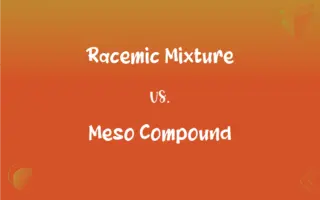Protozoa vs. Protista: What's the Difference?
Edited by Aimie Carlson || By Harlon Moss || Published on January 27, 2024
Protozoa are a diverse group of unicellular eukaryotic organisms, often motile; Protista is a broader category of eukaryotes, including protozoa and other diverse organisms like algae.

Key Differences
Protozoa are primarily unicellular, eukaryotic organisms, known for their motility and animal-like behaviors, such as predation. Protista, a larger group, encompasses all eukaryotes that are neither animals, plants, nor fungi, including protozoa.
Members of Protozoa are often characterized by their ability to move independently, using cilia, flagella, or pseudopodia. Protista includes both motile and non-motile organisms, with a wider range of life forms beyond the characteristics of protozoa.
The term protozoa is traditionally used to refer to "animal-like" microorganisms, such as amoebas and paramecia. Protista, in contrast, also includes "plant-like" and "fungus-like" organisms along with protozoa, making it a more diverse group.
Protozoa are typically found in aquatic environments and soil, playing key roles in ecological food webs. Protista, with its broader classification, is found in a variety of habitats, from oceanic algae to slime molds in forest ecosystems.
The study of protozoa, known as protozoology, focuses on these particular organisms, their life cycles, and their interactions. The study of Protista, protistology, covers a wider range of organisms, including the study of protozoa as a subset.
ADVERTISEMENT
Comparison Chart
Cellularity
Unicellular organisms.
Mostly unicellular, some colonial or multicellular forms.
Kingdom Classification
Classified within the broader group of Protista.
A kingdom including protozoa, algae, and others.
Characteristics
Animal-like, motile, often predatory.
Includes a wide range of characteristics, beyond just animal-like.
Types of Organisms
Includes amoebas, paramecia, and other microorganisms.
Encompasses protozoa, algae, and other diverse eukaryotes.
Ecological Role
Predominantly in food chains in water and soil.
Diverse roles, including photosynthetic algae and decomposers.
ADVERTISEMENT
Protozoa and Protista Definitions
Protozoa
Unicellular, eukaryotic organisms, often motile and predatory.
Amoebas, a type of protozoa, can change shape to move and capture food.
Protista
Eukaryotes that are not classified as animals, plants, or fungi.
Slime molds, part of Protista, are fascinating for their complex life cycles.
Protozoa
Microscopic, single-celled organisms resembling miniature animals.
The malaria-causing Plasmodium is a protozoan parasite.
Protista
A diverse kingdom of eukaryotic organisms, mostly unicellular.
Algae, a type of protist, are crucial for oxygen production in aquatic ecosystems.
Protozoa
A diverse group within Protista, characterized by animal-like behaviors.
Paramecia, common freshwater protozoa, use cilia for movement.
Protista
Organisms in this group can be autotrophic or heterotrophic.
Euglena, a protist, can photosynthesize and also consume food.
Protozoa
Eukaryotes that are neither plants, animals, nor fungi, often aquatic.
Some protozoa, like Giardia, can cause diseases in humans.
Protista
A kingdom characterized by immense diversity in form and function.
Diatoms, protists with intricate silica shells, are important in marine food chains.
Protozoa
Organisms in Protista, mostly known for locomotion and heterotrophy.
Protozoa in pond water are often observed under microscopes in biology classes.
Protista
Includes a wide variety of organisms, from protozoa to algae and beyond.
Kelp, large seaweed, is a multicellular member of the Protista kingdom.
Protozoa
Any of numerous chiefly single-celled eukaryotic organisms, most of which move about freely and ingest food, including the amoebas, ciliates, flagellates, and apicomplexans. Protozoans along with certain algae, oomycetes, and some other groups make up the protists.
Protista
Plural of protiston
Protozoa
Plural of protozoan
Protista
A provisional group in which are placed a number of low microscopic organisms of doubtful nature. Some are probably plants, others animals.
Protozoa
Plural of protozoon
Protista
Eukaryotic one-celled living organisms distinct from multicellular plants and animals: protozoa, slime molds, and eukaryotic algae
Protozoa
The lowest of the grand divisions of the animal kingdom.
Protozoa
In some classifications considered a superphylum or a subkingdom; comprises flagellates; ciliates; sporozoans; amoebas; foraminifers
FAQs
Can protists be multicellular?
While most protists are unicellular, some, like algae, can be multicellular.
Are all protozoa animal-like?
Most protozoa are considered animal-like due to their motility and heterotrophy.
What ecological roles do protists play?
Protists play various ecological roles, from oxygen production to decomposing organic matter.
What are protists?
Protists are a diverse group of eukaryotic organisms, not fitting into animal, plant, or fungal kingdoms.
How do protozoa move?
Protozoa move using structures like cilia, flagella, or pseudopodia.
Can protozoa be seen without a microscope?
Most protozoa are microscopic and require a microscope to be observed.
What defines protozoa?
Protozoa are unicellular, eukaryotic, and often motile organisms, considered a subgroup within Protista.
Are protozoa harmful to humans?
Some protozoa are harmful as parasites, like those causing malaria, but many are harmless.
Do protists include algae?
Yes, algae are a significant and diverse group within the Protista kingdom.
Are all protists single-celled?
While many protists are single-celled, the kingdom also includes multicellular organisms.
How diverse are protists?
Protists are extremely diverse, ranging from microscopic algae to large seaweeds.
Do protozoa photosynthesize?
Most protozoa do not photosynthesize; they are heterotrophic, consuming other organisms.
What habitats do protozoa inhabit?
Protozoa are found in a variety of habitats, including freshwater, marine environments, and soil.
Is protozoology a field of study?
Yes, protozoology is the study of protozoa, focusing on their biology and ecology.
What is the significance of protists in nature?
Protists are crucial for ecological balance, involved in nutrient cycles, and form the basis of many food webs.
Do protists form colonies?
Some protists, like certain algae, can form colonies, though many are solitary.
How do protozoa reproduce?
Protozoa primarily reproduce asexually, though some can have complex life cycles involving sexual reproduction.
Can protists be pathogenic?
Some protists are pathogenic to humans and other organisms, causing diseases.
How are protozoa classified within Protista?
Protozoa are classified in Protista based on their animal-like characteristics.
Do all protists resemble either animals, plants, or fungi?
While some protists have similarities to animals, plants, or fungi, many have unique characteristics not found in these kingdoms.
About Author
Written by
Harlon MossHarlon is a seasoned quality moderator and accomplished content writer for Difference Wiki. An alumnus of the prestigious University of California, he earned his degree in Computer Science. Leveraging his academic background, Harlon brings a meticulous and informed perspective to his work, ensuring content accuracy and excellence.
Edited by
Aimie CarlsonAimie Carlson, holding a master's degree in English literature, is a fervent English language enthusiast. She lends her writing talents to Difference Wiki, a prominent website that specializes in comparisons, offering readers insightful analyses that both captivate and inform.
































































